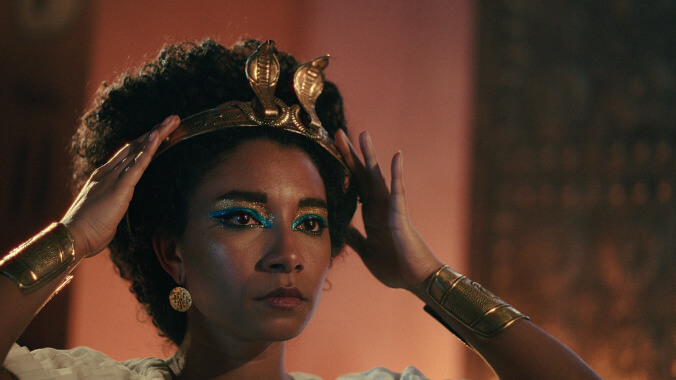African Queens director responds to Cleopatra race backlash
A new installment of African Queens, produced by Jada Pinkett Smith, reignites debate about Cleopatra's race

Whitewashing is a time-honored tradition in Hollywood, one that has touched both fictional and factual characters alike. While there’s been more of an effort to course-correct on this issue in the modern era, there’s still a debate around certain historical figures. For instance: Is it okay to portray Cleopatra as white? Or, as Tina Gharavi explores in her new Netflix docudrama series African Queens (produced by Jada Pinkett Smith), will audiences accept a Cleopatra that’s portrayed as Black?
In a new essay for Variety, Gharavi claims that she faced serious backlash over the casting of Black actor Adele James from Egyptians in particular, who accused her of “‘blackwashing’ and ‘stealing’ their history.” She points out that audiences seem more dismayed at a Black Cleopatra than previous media that depicted her as oversexualized or drug-addicted. “No amount of reasoning or reminders that Arab invasions had not yet happened in Cleopatra’s age seemed to stem the tide of ridiculous comments,” she writes. “Amir in his bedroom in Cairo wrote to me to earnestly appeal that ‘Cleopatra was Greek!’ Oh, Lawd! Why would that be a good thing to you, Amir? You’re Egyptian.”
While Gharavi acknowledges that Cleopatra’s genealogy has been “attributed at one time or another to the Greeks, the Macedonians and the Persians,” she argues that “Cleopatra was eight generations away from these Ptolemaic ancestors, making the chance of her being white somewhat unlikely.” She expresses a desire to get her portrayal of the ancient ruler “right” where previous depictions of the queen “had gotten it so incredibly wrong.” She states, “What the historians can confirm is that it is more likely that Cleopatra looked like Adele [James] than Elizabeth Taylor ever did.”
It should be said that historians do not necessarily confirm this, although there are plenty of different theories of the queen’s ancestry in the running. In 2020, in response to the casting of Gal Gadot in a different Cleopatra project, Betsy M. Bryan (Alexander Badawy Professor of Egyptian Art and Archaeology at John Hopkins University) told Newsweek, “The mother of Cleopatra has been suggested to have been from the family of the priests of Memphis. If this were the case, then Cleopatra could have been at least 50% Egyptian in origin” in addition to her Macedonian roots. Egyptologist Dr. Sally-Ann Ashton argued a similar point to Gharavi’s, telling the outlet, “Cleopatra ruled in Egypt long before the Arab settlement in North Africa. If the maternal side of her family were indigenous women, they were African; and this should be reflected in any contemporary representations of Cleopatra.”
On the other hand, Rebecca Futo Kennedy, an associate professor of Classics at Denison University, proposes that the contemporary question of race is irrelevant in a recent interview with Time. “To ask whether someone was ‘Black’ or ‘white’ is anachronistic and says more about modern political investments than attempting to understand antiquity on its own terms,” she says, arguing that “we continue to have the same conversations decade after decade instead of actually learning more about how the ancient world considered its own identities.”
In that case, should it even be a matter of such fierce debate if one Black actor portrays Cleopatra after a string of white ones? “We need to liberate our imaginations, and boldly create a world in which we can explore our historical figures without fearing the complexity that comes with their depiction,” Gharavi opines. “We re-imagined a world over 2,000 years ago where once there was an exceptional woman who ruled. I would like to draw a direct line from her to the women in Egypt who rose up in the Arab uprisings, and to my Persian sisters who are today rebelling against a brutal regime. Never before has it been more important to have women leaders: white or Black.”